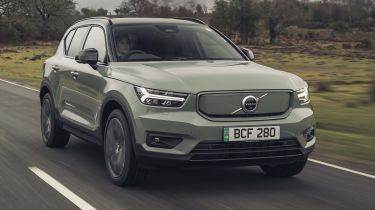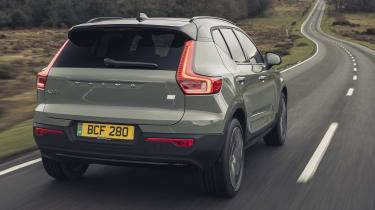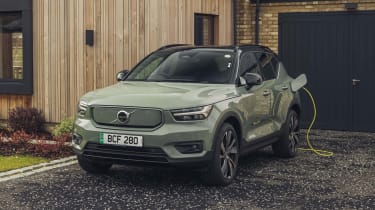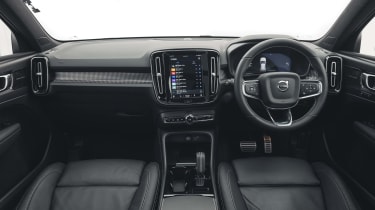2021 Volvo XC40 Recharge electric SUV: single-motor version on sale now
Volvo has introduced a new single-motor version of its electric SUV, available in two trim levels and with prices starting from £48,300
The Volvo XC40 Recharge range has been expanded with the addition of a new single-motor version of the Tesla Model Y and Hyundai Ioniq 5-rivalling electric SUV. It's available to order now, either outright from £48,300 or on subscription, starting from £589 per month.
The sister car to the Polestar 2 and Volvo C40 electric coupe-SUV was initially only available with a dual-motor setup, producing 402bhp and capable of covering 259 miles on a single charge. The new single-motor version is front-wheel-drive only, with 227bhp on tap and a maximum range of 261 miles from its smaller 69kWh battery, compared to the 78kWh unit in the all-wheel-drive model. Acceleration from 0-62mph takes 7.4 seconds, while the dual-motor model can do the same sprint in under five seconds.
You get a choice of two trim levels for the single-motor XC40 Recharge: Plus and Pro, costing £48,300 and £53,050 respectively. While not currently available to order, the XC40 Recharge Twin is expected to be on sale again in the UK soon, when stocks become available.
As well as being able to buy outright, the electric SUV is available on the Swedish brand’s Care by Volvo subscription service. The first package is simply called Care by Volvo, and costs from £589 per month on a three-year term. Unlike a traditional lease, there are no deposit or sign-up fees. Alternatively, you can go for Care by Volvo Flexible, which starts from £739 per month. This is an ‘open-ended’ plan, with a three-month rolling contract, plus you have a 30-day trial period with no notice required.
As well as the car, Volvo’s subscription packages include scheduled servicing, wear-and-tear maintenance, road tax, replacement tyres and roadside assistance. You can add insurance to your plan, too, but that costs extra.
In October 2021, Volvo introduced a Range Assistant in-car app for the XC40, which is being released as a part of an over-the-air (OTA) software update. According to Volvo, the app will help drivers maximise and monitor accurate, real-time electric range from their car. The app can optimise energy management and automatically adjust the climate control to a more efficient setting when required. The same app is also being added to the C40 coupe-SUV and the Polestar 2.
Keep scrolling to learn more about the electric XC40 Recharge, or click here to find out what it’s like on the road...
Volvo XC40 Recharge range, battery, power and performance
The entry-level electric XC40 Recharge features a single motor that sends all of its 227bhp to the front wheels. Energy is stored in a 69kWh battery, holding enough juice to cover up to 261 miles on a charge, while 0-62mph takes 7.4 seconds. A full top-up from a 7.4kWh home wallbox should take around 10 hours, while an 80% top-up from a 150kW DC rapid charger is likely to take around half an hour.
As the name suggests, the XC40 Recharge Twin gets a dual-motor setup, with an electric motor on each axle for a total power output of 402bhp and 660Nm of torque. This version is capable of 0-62mph in 4.9 seconds and thanks to its 78kWh battery can cover up to 259 miles on a charge, depending on which trim level you opt for.
Volvo claims a full top-up from an 11kW Type 2 home wallbox will take less than eight hours, or closer to 12 if you use a more common 7kW unit. Recharging from 0-80% using a 150kW public rapid charger should take around 40 minutes.
Prices, trim levels and features
All XC40 Recharge models come with Volvo’s Android-based operating system, which you can operate using the car's nine-inch central infotainment touchscreen. Services include Google Maps, Google Assistant voice control and access to apps enabled for automotive use through the Google Play Store.
The entry-level XC40 Recharge Plus (£48,300) gets LED headlights, dual-zone climate control, wireless phone charging, a 12.3-inch digital driver’s display, a powered tailgate, rear parking sensors and 19-inch alloy wheels as standard. It also features a heat pump that reduces energy consumption when heating up the car’s cabin, for improved range in colder weather. Above that is the XC40 Recharge Pro (£53,050), which comes with 20-inch alloy wheels, a 360-degree parking camera, upgraded Harman Kardon sound system, panoramic sunroof and additional safety system as part of the ‘Driver Assistance’ package.
Interior and infotainment
Much of the interior of the Volvo XC40 Recharge is carried over from Volvo’s current line-up with the exception of the Android-based infotainment system. This uses technology and services developed by Google, with the aim of “reducing driver distraction” and offering “improved levels of intuitiveness”.
Google Assistant provides voice control of the sat nav, temperature control and in-car media, while Google Maps uses real-time traffic data to avoid congestion. Additional apps are available to download through the Google Play Store. Volvo XC40 Recharge drivers can also use the Volvo On Call app, which allows you to monitor charging sessions remotely, as well as preheat your car before a journey.
In addition to the 452-litre boot at the rear, the XC40 Recharge also benefits from a 31-litre ‘frunk’ under the bonnet thanks to the absence of an engine – ideal for storing your charging cables.
Safety
Volvo has completely redesigned the front of the XC40 Recharge to cope with the absence of an internal-combustion engine. Elsewhere, the manufacturer has devised an aluminium cage to protect the car’s battery in the event of a collision. This helps create a crumple zone around the cells, which – as is normal in an electric car – are located under the floor.
Volvo says this has the added benefit of reducing the risk of the vehicle rolling over in an accident. The back of the electric XC40 has been reinforced, too: the company says that the “electric powertrain has been integrated with the body structure” to help direct collision forces away from the cabin and any passengers inside.




